Select Language
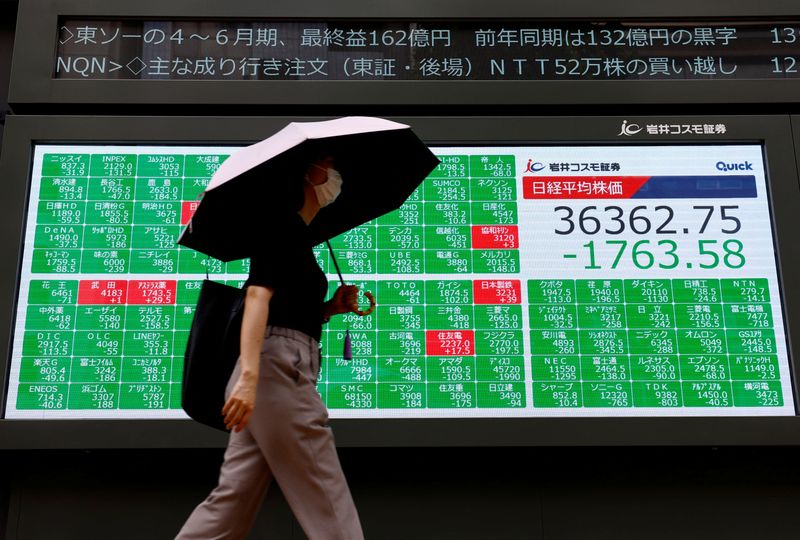
By Stella Qiu
SYDNEY (Reuters) - Asian shares stuttered on Friday while the dollar rebounded from one-year lows as investors were cautious ahead of a speech by the world's most powerful central banker with markets looking for confirmation U.S. rate cuts would start in September.
The Japanese yen gained 0.3% to 145.77 per dollar while bond yields edged up as Bank of Japan Kazuo Ueda spoke before lawmakers.
Traders see very little chance that the BOJ could hike rates in October after the recent sell-off, but Ueda stuck to the script by saying the central bank stood ready to raise rates if the economy and prices move in line with its forecast.
Data out early in the day showed Japan's core inflation accelerated for a third straight month, but a slowdown in demand-drive price gains suggest no urgency for any immediate rate hikes.
Krishna Bhimavarapu, APAC economist at State Street (NYSE:STT) Global Advisors, expects the stronger yen and reintroduction of energy subsidies to slow inflation in the near-term.
"If the data evolves as we expect, it could mean that the next BOJ hike may not come until December as fears of rapid inflation ease to an extent."
On Friday, MSCI's broadest index of Asia-Pacific shares outside Japan fell 0.4% but were headed for a weekly gain of 0.6%. The Nikkei was flat near three-week highs.
China's blue chips gained 0.3%, although Hong Kong's Hang Seng fell 0.4% while South Korea dropped 0.5%.
Overnight, Wall Street fell as sentiment turned cautious ahead of the Federal Reserve Chair Jerome Powell's speech in Jackson Hole. Three Fed speakers on Thursday alluded to a rate cut in September, with them voicing support for a "slow and methodical" approach.
Taken together with surveys showing the U.S. economy still growing at a healthy pace, markets slightly pared back the chance of an outsized half-point cut in September to 24%, from 38% a day earlier. A quarter-point reduction is fully priced in.
Robert Carnell, regional head of research, Asia-Pacific, at ING, noted there was still scope for Powell's speech to excite or disappoint markets given the market pricing, but much will depend on data.
"As any decision that deviates from market pricing will rest on as yet unknown data, it is hard to see how Powell can commit to much beyond some easing of some sort in September, and even then, only barring data accidents," said Carnell.
Treasury yields slipped a little on Friday, having gained overnight for the first time in five sessions. Ten-year yields fell 2 basis points to 3.8426% in Asia and were down 5 bps for the week.
Two-year yields also dropped 3 bps to 3.9845% and were down 8 bps for the week.
Declining yields pressured the dollar to one-year lows, although it did get some respite from selling pressure overnight. The euro came off its one-year high at $1.1119, with major resistance seen at $1.1139.
Wall Street futures rose between 0.2%-0.4% and commodities looked set to end the week lower.
Brent crude futures were flat at $76.04 a barrel, although they are down more than 3% for the week as swelling U.S. crude stocks and a weakening demand outlook in China have raised pessimism. [O/R]
Gold prices are 0.7% lower in the week to $2,488.13 an ounce, having hit a record high of $2,531.6 just on Tuesday.
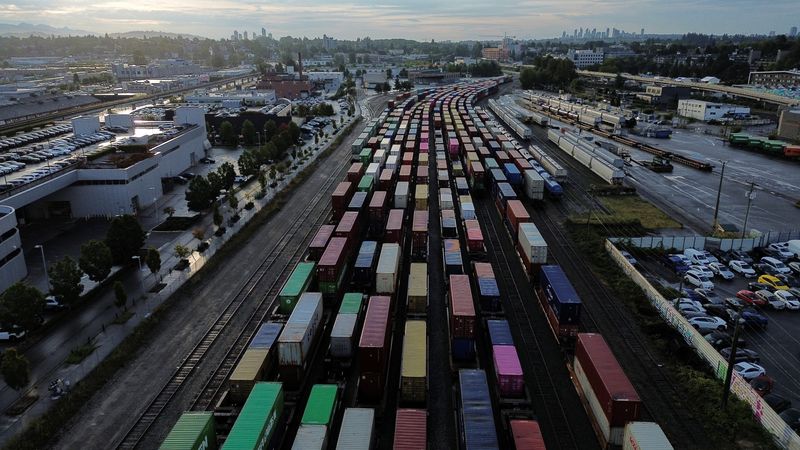
By Promit Mukherjee
OTTAWA (Reuters) - Canada's economy could shrink by billions of dollars this year if a rail stoppage that began on Thursday continues for weeks, and the knock-on effects would swell jobless numbers and consumer prices, economists and analysts warned.
However, the economic impact could be minimal if the stoppage lasts less than a week, they said.
Canada's two biggest freight rail operators Canadian National Railway (TSX:CNR) and Canadian Pacific (NYSE:CP) Kansas City locked out workers affiliated with the Teamsters union on Thursday, after both companies and the union failed to conclude labor deals.
"If you have a stoppage that is extended, that drags out, that could be really devastating," said Pedro Antunes, chief economist at the Conference Board of Canada, an economic think-tank.
A two-week rail strike would result in a $3-billion loss in nominal GDP this year, and a four-week strike could lower GDP by nearly $10 billion in 2024, he said, adding it could result in 49,000 job losses in the year.
The unprecedented simultaneous stoppage of the majority of Canada's rail freight is "growth-negative and inflation-positive," said Robert Kavcic, senior economist with BMO Capital Markets.
Kavcic expects that the stoppage could shave around 0.1 percentage points each week from economic growth, "but the impact could build the longer it drags on," he warned. This translates into a weekly impact of over $2 billion in nominal GDP terms.
Canada's economic growth has been lackluster this year as consumers and businesses reeled under near 23-year-high interest rates before the Bank of Canada started trimming its policy rate in June.
After cutting interest rates in July for a second straight month, Governor Tiff Macklem hinted at shifting the bank's focus to boosting the economy rather than suppressing inflation.
First-quarter GDP growth was 1.7%, far below the bank's April forecast, and weakness in the economy made it scale down growth expectations this year to 1.2% from 1.5% in April.
Economists have said that rising unemployment, which hit a 30-month high last month, and a wave of around C$300 billion ($220.78 billion) in mortgage renewals next year, will keep economic conditions strained.
Amid all this, a protracted rail stoppage could lead to economic inertia, warned economists.
Derek Holt, head of capital markets economics at Scotiabank said that a one- to three-week strike could have a 0.1%-0.2% monthly drag on GDP, but its impact would rise exponentially with each passing day beyond three weeks.
The world's second-largest country by area, Canada relies heavily on CN and CPKC to ship grain, fertilizers and other commodities, along with manufactured goods such as chemicals and automobiles.
The total rail freight cargo hauled annually in Canada tops C$380 billion, with the vast majority moving on CN and CPKC's tracks.
Randall Bartlett, senior director of Canadian economics at Desjardins, said past rail stoppages have not usually continued beyond a week or 10 days.
"If it is short-lived like (in the) past, the impact is minimal," he said, adding a stoppage would do significant economic damage if it continues beyond a few weeks.
($1 = 1.3588 Canadian dollars)

(Reuters) - British consumer confidence held at an almost three-year high in August, bolstered by improving sentiment around personal finances and major purchases, according to a survey on Friday that added to positive signals in the wider economy.
The GfK Consumer Confidence Index, Britain's longest-running gauge of economic morale among members of the public, was steady in August at -13, matching July's 34-month high. A Reuters poll of economists had pointed to a reading of -12.
The survey follows mostly positive data from companies since Prime Minister Keir Starmer's Labour Party won a landslide election victory last month. Business surveys put the economy on course for solid growth in the second half of 2024.
The survey's measure of enthusiasm for major purchases rose to its highest level since January 2022, while the outlook for personal finances also notched higher.
"This more positive outlook may be due to a mortgage-friendly interest rate cut at the beginning of August, and hopes of more to come," said Joe Staton, client strategy director at market research company GfK.
The BoE cut borrowing costs from a 16-year high of 5.25% earlier this month but Governor Andrew Bailey and other top officials have signalled they might not follow that up with rapid further reductions in rates.
Investors were assigning a less than 30% chance of a September rate cut on Thursday.
A Reuters poll of economists published on Wednesday suggested the BoE will cut interest rates just once more this year, in November.
The GfK report's gauges of past and future economic sentiment cooled, however.

By Farah Master and Laurie Chen
HONG KONG/BEIJING (Reuters) - Mary Meng is so busy and stressed working for a Chinese tech company in Shanghai that she can't imagine having a second child.
"The work pressure is such that you don't even have any time to spend with your child," said the 37-year-old mother of a primary school-aged boy. "How can I think about taking care of two children? I have no idea."
That resonates with urban residents anywhere. But given the pace of population decline and ageing in China, the impact of the fast-paced, expensive city life on birth rates should be treated with more urgency by Beijing, demographers say.
China is rapidly running out of mothers. The number of women of reproductive age, defined by the United Nations as 15-to-49, is set to drop by more than two-thirds to under 100 million by the end of the century.
At a twice-a-decade top political gathering last month, China announced plans to build a "birth-friendly society" - pledging to implement measures long-called for by population experts, such as lowering childcare and education costs.
But, to the despair of the same experts, Beijing also vowed to encourage more people into urban areas.
This policy aims to increase housing demand to prop up the crisis-hit property sector, and revive flagging economic growth through productivity gains and stronger consumption. Urban residents typically produce and buy higher value-added goods and services than their rural counterparts.
But the fresh urbanisation push overlooks basic demographic theory. In the cities, people have fewer children due to high housing costs, limited space, expensive education, and because they spend most of their day at work.
Couple infertility rates in China have also risen from 2% in the 1980s to 18%, versus around 15% globally - with doctors blaming the rise on factors such as stress related to urban jobs and industrial pollution.
Fertility rates in China's rural areas are slightly higher at 1.54 versus the national average of 1.3 in 2020, according to the latest breakdown from China's top economic planner, while Shanghai's fertility rate in 2023 was 0.6 versus 1.1 nationally.
Authorities are "foolishly" driving young people "to the most birth-unfriendly big cities, which will lead to a continued decline in fertility and exacerbate the ageing crisis," said Yi Fuxian, a demographer at the University of Wisconsin-Madison.
"The suppression of fertility rates by population density is a biological law."
This phenomenon has been most evident in east Asia. Japan, South Korea and Taiwan urbanised and industrialised at a faster pace than most other economies post-World War Two. They also have the lowest fertility rates globally.
While China's birth rates are also very low after decades of a strict one-child policy, not all is lost.
At 65%, its urbanisation rate is lower than the 80-90% rates in Japan or South Korea - and this could give it room for manoeuvre, demographers say.
Improving rural living standards by providing better public services or liberalising land rights would have a more sustainable impact on economic growth than continuing urbanisation as they could improve birth rates, they say.
"The population size is always a multiplier" in the economy, said Samir KC, professor at the Asian Demographic Research Institute at Shanghai University.
'JUST SURVIVAL'
To have a stable population, countries need fertility rates of 2.1. That means that for every woman like Meng, who only raises one child, another would need to have three.
Poppy Yu, 21, who works at film production company in Beijing six or seven days a week, wants none.
"I don’t have the money or energy," Yu said.
China's "birth-friendly society" vision entails bringing down costs of parenting and education, lengthening parental leave, upgrading maternity and paediatric care and boosting child subsidies and tax deductions.
Many countries offer such incentives. But those with successful birth policies - such as France or Sweden - stand out through greater gender equality, stronger labour rights and robust social welfare.
Reducing childcare costs does not work on its own "and instead promotes a certain set of family values that demand that women take domestic responsibilities," said Yun Zhou, demographer at the University of Michigan.
Meng believes no policy would work until Chinese people start hoping again for a better life, financially.
"Now everyone thinks there is no prospect at all," she said. "No matter how hard you work, it is just survival."
($1 = 7.1469 Chinese yuan renminbi)

By Indradip Ghosh
BENGALURU (Reuters) - India's business activity extended its robust growth streak in August as a stronger services industry offset a slight slowing in manufacturing expansion, according to a survey that indicated price pressures also were easing.
Those findings suggest India will hold on to its title of fastest-growing major economy over coming quarters despite expectations of a slowdown in the global economy.
HSBC's flash India Composite Purchasing Managers' Index, compiled by S&P Global, dipped slightly to 60.5 in July from last month's final reading of 60.7, in line with a Reuters poll forecast.
August marked over three years of expansion, the longest such run since June 2013. The 50-level separates growth from contraction.
"India's flash composite PMI slipped slightly in August, though it remained significantly higher than the historical average," noted Pranjul Bhandari, chief India economist at HSBC.
"Although new order growth for the manufacturing sector slowed to the weakest since February, the pace of expansion remained sharp, indicating continued strong demand and favourable market conditions."
The flash services PMI index rose to 60.4 this month from 60.3 in July, while a preliminary manufacturing PMI showed strong growth, albeit slightly weaker than last month. It declined to 57.9 from 58.1.
Although growth in overall demand slowed to a three-month low in August, it remained robust. However, exports expanded at the slowest rate since April, indicating weak global demand.
Overall input costs increased at their weakest pace since February and output prices rose at a slower rate compared to last month.
Even so, prices charged on manufactured goods surged at the fastest in nearly 11 years.
India's retail inflation fell in July to a near five-year low, largely due to a high-base effect, suggesting the slower pace of price rises was temporary and the Reserve Bank of India needs to be cautious.
Concerns around inflation and competition led business confidence for the coming 12 months to wane in August.

By Giselda Vagnoni
PORTICELLO, Italy (Reuters) -Four bodies were retrieved on Wednesday from the sunken wreck of a yacht belonging to the wife of British tech magnate Mike Lynch, the Italian fire brigade said, adding that they were continuing to search for two missing people.
The bodies were brought ashore on rescue boats and taken to nearby hospitals for formal identification. Local authorities refused to give any information about who they might have found.
Britain's Daily Telegraph reported that two of the dead were Lynch and his 18-year-old daughter, while Italy's Corriere della Sera said the only bodies identified so far were Morgan Stanley banker Jonathan Bloomer and U.S. lawyer Chris Morvillo.
Bloomer's wife, Judy, and Morvillo's wife, Neda, also vanished when the British-flagged Bayesian, which had been carrying 22 people, was hit by a fierce, pre-dawn storm on Monday and sank.
Lynch, 59, was one of the UK's best-known tech entrepreneurs and had invited friends to join him on the luxurious yacht to celebrate his recent acquittal in a U.S. fraud trial.
The 56-meter (184-foot) Bayesian had been anchored off the Sicilian port of Porticello when the storm struck and witnesses said it disappeared beneath the waves in a matter of minutes, baffling naval marine experts who said such a vessel, presumed to have top-class fittings and safety features, should have been able to withstand such weather.
The yacht is lying on its side at a depth of around 50 metres (165 feet), apparently largely intact.
Specialist rescuers have been searching inside the hull of the sunken yacht for the past two days. The victims were believed to have been trapped in cabins, which have proved extremely hard to get to, with divers only able to stay in the vessel for 8-10 minutes before having to re-surface.
Fifteen people, including Lynch's wife, managed to escape the boat before it capsized, while the body of the onboard chef, Canadian-Antiguan national Recaldo Thomas, was found near the wreck hours after the disaster.
Besides the diving team, the coast guard has deployed a remotely operated vehicle to scan the seabed and take underwater pictures and videos that it said may provide "useful and timely elements" for prosecutors looking into the disaster.
MYSTERY
The coast guard has been questioning survivors, including the captain of the Bayesian, and passengers on the yacht that was moored next to it who witnessed the ship going down, judicial sources said. That vessel survived unscathed.
No one is under investigation at the moment, sources added.
The Bayesian was built by Italian shipbuilder Perini in 2008 and was last refitted in 2020. It had the world's tallest aluminium mast, measuring 72 metres (236 feet), according to its makers.
Lynch has been referred to as Britain's Bill Gates. He built the UK's largest software firm, Autonomy, which was sold to HP (NYSE:HPQ) for $11 billion in 2011, after which the deal spectacularly unravelled with the U.S. tech giant accusing him of fraud, resulting in a lengthy trial.
He was acquitted on all charges by a jury in San Francisco in June. Morvillo, who works for Clifford Chance, represented him at the trial, while Bloomer was a character witness on his behalf.
Bayesian's captain, James Cutfield, a 51-year-old New Zealander who survived the shipwreck, was a "very good sailor" and "very well respected" in the Mediterranean, his brother Mark told The New Zealand Herald.
Matthew Schanck, chair of the Maritime Search and Rescue Council, a UK-based non-profit organisation that trains sea rescuers, said the Bayesian was the victim of a "high impact" weather-related incident.
"If it was a water spout, which it appears to be, it's what I would class as like a black swan event," he told Reuters, meaning a rare and unpredictable phenomenon.
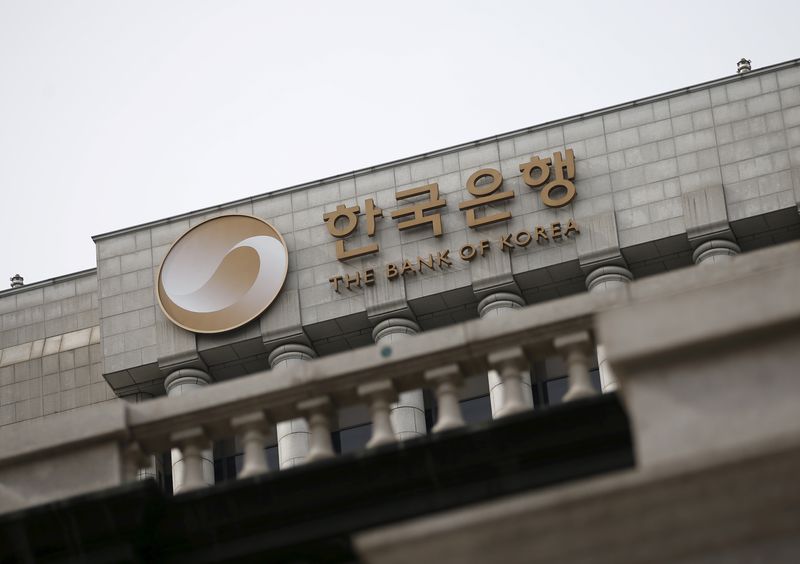
By Cynthia Kim and Jihoon Lee
SEOUL (Reuters) - South Korea's central bank kept interest rates unchanged for a 13th straight meeting on Thursday, as policymakers prioritised the need to keep stubborn inflation in check even as the case for rate cuts later this year grows.
The Bank of Korea held its benchmark interest rate at 3.50% at its monetary policy review, as expected by 38 out of 40 economists surveyed by Reuters.
The BOK also downgraded forecasts for both growth and inflation this year.
It cut 2024 growth forecast to 2.4% from 2.5% previously, after Asia's fourth-largest economy unexpectedly contracted in the second quarter. It now sees consumer inflation at 2.5% for this year, slower than 2.6% seen previously.
Economists expect the BOK to start cutting interest rates at the bank's next policy meeting on Oct. 11, around the same time the U.S. Federal Reserve is expected to deliver its first rate cut in four years.
The prospects on an October cut come as the BOK's global peers unwind the aggressive policy tightening of recent years with central banks in Canada, New Zealand and the euro zone having all loosened monetary settings.
Rising apartment prices in Seoul took centre stage in policy talks with the government earlier this month announcing plans to increase housing supply to cool surging prices.
That's one reason analysts think the BOK may go slow on rate cuts.
Inflation has generally cooled enough to soothe concerns over price pressure but a resurgence in household debt on the back of expectations for interest rate cuts has raised concerns about easing too soon.
"Considering that household debt is increasing fast, we expect there to be only one rate cut this year. We think the BOK will remain relatively hawkish," said Kim Jun-yeong, an analyst at DS Investment & Securities, who sees a cut in the fourth quarter.
The focus is on Governor Rhee Chang-yong's press conference at 0210 GMT, where the names of any dissenters could be announced. Dissenting votes typically lead to policy changes in subsequent months.
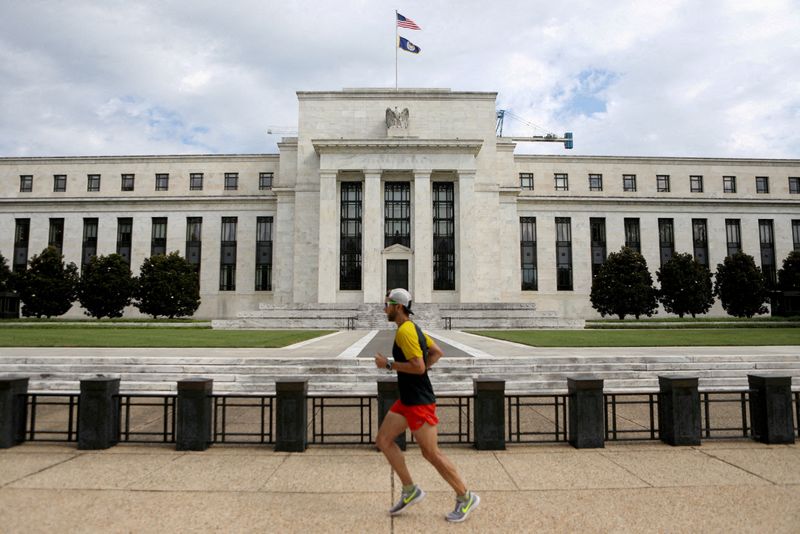
By Michael S. Derby and Dan Burns
WASHINGTON (Reuters) - The Federal Reserve appears to be very much on track for an interest rate cut in September after a "vast majority" of officials said such an action was likely, according to the minutes of the U.S. central bank's July 30-31 meeting.
The minutes, which were released on Wednesday, even showed some policymakers would have been willing to reduce borrowing costs at last month's gathering.
The policy-setting Federal Open Market Committee left its benchmark interest rate unchanged in the 5.25%-5.50% range on July 31, but opened the door to a cut at the Sept. 17-18 meeting.
Financial markets have been expecting the September meeting to kick off the Fed's policy easing, with as much as a full percentage point worth of rate cuts expected by the end of this year.
At the July meeting, most policymakers thought that "if the data continued to come in about as expected, it would likely be appropriate to ease policy at the next meeting," the minutes said.
They also noted "many" Fed officials viewed the stance of rates to be restrictive and "a few participants" contended that amid an ongoing cooling in inflationary pressures, no change in rates would mean that monetary policy would increase the drag on economic activity.
While all Fed officials were on board with keeping rates steady in July, the minutes revealed that "several" policymakers said progress in lowering inflation amid a rise in joblessness "had provided a plausible case" for a quarter-percentage-point cut in July, "or that they could have supported such a decision" had it been on the table.
The minutes also showed that a dwindling camp of policymakers feared a premature easing in monetary policy could restart inflation.
Jamie Cox, managing partner at Harris Financial Group, said "the Fed minutes removed all doubt about a September rate cut." He added that "the Fed's communication strategy is to make its meetings less of a market-moving event, and they are following the script to the letter."
With the Fed letting the data determine what happens with rates, central bank watchers are already contemplating the future scope of cuts and whether aggressive action is needed at the onset of the easing cycle.
"It may not be too heavy a lift for (Fed) Chair (Jerome) Powell to move the Committee now to a baseline of three 25-basis-point cuts in a row" through the end of the year, analysts at Evercore ISI said. They added that there's a "reasonably low bar" for half-percentage-point cuts, but that would likely require a "more pronounced weakening" in the job market relative to the softness seen in hiring data in July.
BALANCE OF RISKS
The case for cutting rates rests on the ebbing of price pressures back to the central bank's 2% target and increased anxiety about the state of the job market in the wake of recent data showing a rise in the unemployment rate.
The speed of the jump in the jobless rate, which bottomed at 3.4% early last year and has since climbed to 4.3% as of last month, has added urgency to the debate over rate cuts and has prompted some analysts to say that a half-percentage-point reduction in borrowing costs should be considered next month.
The minutes noted that officials see the job market as having largely returned to where it was before the COVID-19 pandemic started, and described the job market as "strong but not overheated."
Markets showed little reaction to the release of the minutes, with stocks rising modestly to end the day higher and bond yields falling. Fed funds futures showed the probability of a quarter-percentage-point cut at the September meeting falling slightly from Tuesday and the odds of a half-percentage-point reduction edging higher.
Powell largely tipped off the likely outlook after the July policy meeting when he said "if we do get the data that we ... hope we get, then a reduction in our policy rate could be on the table at the September meeting."
The Fed's concerns about the job market may be underpinned by the Labor Department's estimate on Wednesday that 818,000 fewer payroll jobs existed in March than previously reported. The change was part of the annual benchmark revision process.
Those revisions may not have caught Fed officials off guard, with the minutes noting "reported payroll gains might be overstated," which means the economy might not need to add as many new positions each month to keep the jobless rate steady.
The minutes also noted that a "majority" of Fed officials saw risks to the job market as having increased while risks to the inflation mandate had been reduced.
The current level of joblessness is already higher than the 4% level Fed officials penciled in for this year in their updated economic projections in June, and the 4.2% policymakers projected for the end of next year.
Markets are likely to get an update of Powell's views on Friday when he speaks at the Kansas City Fed's annual research conference in Jackson Hole, Wyoming. A number of other Fed officials are also likely to weigh in on the outlook while attending the conference.
Another major point for the monetary policy outlook comes in early September with the U.S. Labor Department's release of the employment report for August.
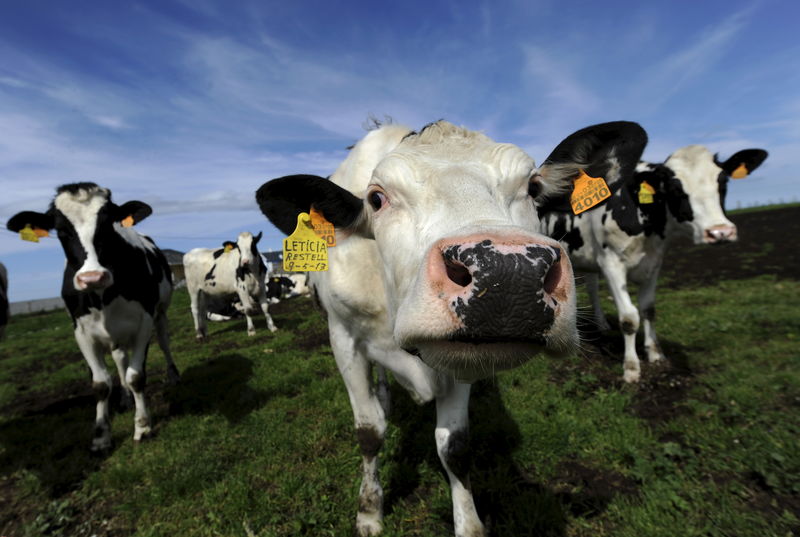
BEIJING (Reuters) -China has opened an anti-subsidy investigation into imported dairy products from the European Union, a step that appears mainly aimed at Ireland and in response to the bloc's curbs on its electric vehicle exports.
The investigation announced by China's commerce ministry on Wednesday will focus on various types of cheeses, milks and creams intended for human consumption.
The probe began on August 21.
It was prompted by a complaint submitted by the Dairy Association of China and the China Dairy Industry Association on July 29 on behalf of the domestic dairy industry, the ministry said.
China will examine 20 subsidy schemes from across the 27-strong bloc, specifically those from Austria, Belgium, Croatia, Czech Republic, Finland, Italy, Ireland, and Romania, it said in a statement.
Of the countries listed, Ireland is by far the biggest exporter of dairy products to China, having sold $461 million worth of goods to the Asian nation last year.
The EU on Tuesday revised its proposed punitive duties on imports of Chinese-made electric vehicles, but fell short of abandoning them, as Beijing had called on Brussels to do.

BANGKOK (Reuters) - Thailand's economy is nearly in crisis due to declining exports and uncompetitive manufacturing, the country's caretaker finance minister said on Wednesday.
Exports accounts for 70% of the economy but the manufacturing sector can't meet market demand, Pichai Chunhavajira told a business seminar.
"We can't compete. We can't adapt in time," he said.
Southeast Asia's second-largest economy grew 2.3% in the April-June quarter from a year earlier, accelerating from the 1.6% growth in the prior quarter.
But quarter-on-quarter growth slowed to 0.8% in the second quarter from the 1.2% expansion in the previous three months.
The finance ministry predicts economic growth of 2.7% for 2024, after last year's growth of 1.9%, which lagged regional peers.
The central bank is widely expected to leave its key interest rate unchanged at a more than decade-high of 2.50% for a fifth straight meeting later on Wednesday.

